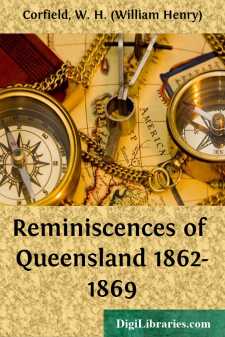Categories
- Antiques & Collectibles 13
- Architecture 36
- Art 48
- Bibles 22
- Biography & Autobiography 813
- Body, Mind & Spirit 142
- Business & Economics 28
- Children's Books 17
- Children's Fiction 14
- Computers 4
- Cooking 94
- Crafts & Hobbies 4
- Drama 346
- Education 46
- Family & Relationships 57
- Fiction 11829
- Games 19
- Gardening 17
- Health & Fitness 34
- History 1377
- House & Home 1
- Humor 147
- Juvenile Fiction 1873
- Juvenile Nonfiction 202
- Language Arts & Disciplines 88
- Law 16
- Literary Collections 686
- Literary Criticism 179
- Mathematics 13
- Medical 41
- Music 40
- Nature 179
- Non-Classifiable 1768
- Performing Arts 7
- Periodicals 1453
- Philosophy 64
- Photography 2
- Poetry 896
- Political Science 203
- Psychology 42
- Reference 154
- Religion 513
- Science 126
- Self-Help 84
- Social Science 81
- Sports & Recreation 34
- Study Aids 3
- Technology & Engineering 59
- Transportation 23
- Travel 463
- True Crime 29
Reminiscences of Queensland 1862-1869
Categories:
Description:
Excerpt
CHAPTER I.
As it is in the blood of most Englishmen from the "West Country" to seek adventure abroad, it is little wonder that the visit of an uncle from Australia strengthened a desire I felt to seek my fortune in that country. This uncle—H. C. Corfield—was the owner of some pastoral country in the Burnett district, and described in glowing terms life in the Australian bush. I might say here this was not all it had been painted, but that by the way.
And so it happened that on a cold, foggy morning in February, 1862, I found myself with an old schoolmate—George Custard—on board of, as it was then customary to advertise, "the good ship, 'City of Brisbane,' 1,100 tons burthen, 'Neville,' Master," which lay in Plymouth Sound, waiting her final complement of passengers for Queensland.
Mr. Henry Jordan, who was representing the Colony, came on board to address the passengers, who, he said, were going to a land of promise, where in the evening of his life, a man—as the reward of his labour—would sit in the shade of his own fig tree and enjoy the rest he had earned.
Soon the capstan was manned, and the anchor lifted to the old chantey:
For tinkers, and tailors, and lawyers, and all,Way! Aye! Blow the men down!
They ship for real sailors, aboard the Black Ball,
Give me some time to blow the men down.
Blow, boys, blow, to Californeo-o-!
There's plenty of gold, so we've been told,
On the banks of Sacremento!
This we found was our good-bye to England, and, towed out by a tug, we commenced our long voyage to Australia. When well clear of the land, the tug dropped us, and with a favourable breeze, we made quick passage to the entrance of the channel.
By this time most of the passengers were suffering the usual disabilities felt by landsmen for the first few days at sea. I soon gained my sea legs, and was able to take a view of my surroundings.
Here we were—365 human beings, who would be cooped up for weeks in a sailing ship, and with as many different characters, sympathies and antipathies, one wondered if it could be possible to live long with harmony and unselfishness in such daily crowded contact. I suppose we were representative of the many, who, whether in the poop or steerage of similar ships, were looking hopefully towards the far off, not-long-named southern colony, which was becoming known to the people of Great Britain.
I was just nineteen, and all things looked bright and cheerful, but I was impatient for the time when, on a bounding steed, I would be scouring the plains, following the sheep and cattle on my uncle's property where, as an employee, I was to begin my adventures.
After a passage of 137 days, spent either in glorious runs before favouring winds, wearisome calms, or battling against heavy gales, we arrived in Moreton Bay, and in due course at Brisbane.
The city, as it was in 1862, has so often been described, that it is unnecessary for me to say anything as to its appearance. All I need say is that it did not enter my mind to anticipate its growth and importance....


